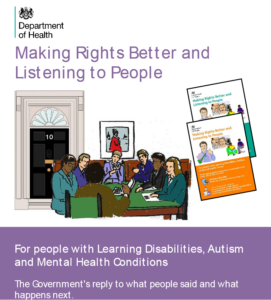‘No voice unheard, no right ignored’ may have been the title and intent of the government’s consultation for people with learning disabilities, autism and mental health conditions, but it’s not a bad summation of our approach as social workers too.
With the government’s response now published, it remains our job to build relationships through engaging, listening, understanding and respecting what matters to a person and the life they want. It’s about making sure they, their families and advocates, have every opportunity to query, challenge and otherwise be involved in decisions about their care and support.
 As a profession we will continue to support efforts to move away from institutional services where they are not absolutely necessary, and use our practice to influence models of care which emphasise the value of community based solutions. More broadly, now that our responsibilities and expertise are fully recognised and embedded in the Care and Mental Health Acts, awareness of our value and effectiveness can only grow.
As a profession we will continue to support efforts to move away from institutional services where they are not absolutely necessary, and use our practice to influence models of care which emphasise the value of community based solutions. More broadly, now that our responsibilities and expertise are fully recognised and embedded in the Care and Mental Health Acts, awareness of our value and effectiveness can only grow.
The responses to the consultation have only underlined the fact that individuals and families want and need information, transparency and accountability. The proposed involvement of a named social worker to achieve this is a development I wholeheartedly welcome. Social workers can develop a relational social work approach, provide continuity and be able to challenge or query decisions from a professional standpoint. Perhaps more importantly, they can be a single point of contact for individuals and their families, regardless of where their care is provided.
It is this professional use of self that lies at the heart of social work – our way of supporting people to lead the lives they want. By definition, our closeness to people in need, at so many points in their health and wellbeing journey, makes our assessments and intervention invaluable. Perhaps the greater enterprise of integrating health and social care has been the catalyst for this shift. Either way, it’s a development I welcome.
A named social worker could, I believe, generate peace of mind and confidence on all sides, mitigating the sometimes adversarial atmosphere which can arise when queries over care are raised. I will be working with officials in the Department of Health to pilot this proposal in a small number of local authorities. This is a real opportunity to show the valuable contribution social work can make and I’m really keen to get started and test ways of working across the health and care system.
Anecdotally, we know that relational social work in supporting individuals with learning disabilities has resulted in more people living in community based settings, achieving greater inclusion and independence. And it is as much about supporting parents and family carers as it is their loved ones – the holistic approach which seeks better outcomes by considering a person’s social, domestic and physical environment not just emotional and psychological issues.
On the ground, social workers’ location in local authorities provide them with the unique opportunity to ensure community resources and services are inclusive and include adequate provision for supported housing developments, outreach resource centres and personalised care and support plans. It’s another obvious point, but if your accommodation and local service provision are miserable, chances are you will be too! The recently announced NHSE, LGA and ADASS National Plan to improve community based learning disabilities services, Building the Right Support, can only help us to challenge and change substandard or inappropriate environments and processes.
So when the government response speaks of the need for health and care services to treat “people with learning disabilities and their families …with dignity and respect”, making sure they enjoy “the same rights as everyone else,” it’s clear to me just how important and powerful our profession continues to be in the pursuit of better life outcomes for all.
Leave a comment